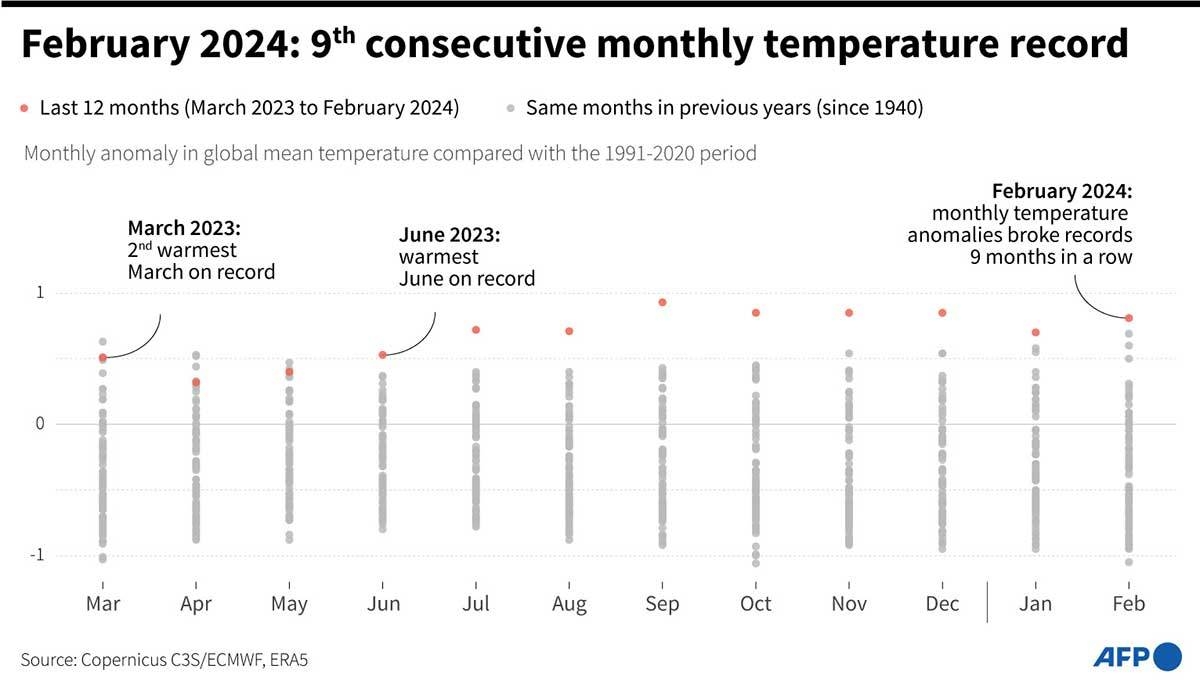Last month, the world experienced the warmest February on record, marking the ninth consecutive month of historic high temperatures globally. The Copernicus Climate Change Service (C3S) confirmed that climate change is pushing the planet into “uncharted territory.”
The past year has been characterized by extreme weather events, including storms, droughts, and wildfires, all exacerbated by human-caused climate change. The naturally occurring El Niño weather phenomenon has further intensified these impacts, resulting in temperatures that are likely the hottest in over 100,000 years.
In its latest monthly update, C3S revealed that the period from February 2023 to January 2024 saw 12 consecutive months with temperatures 1.5 degrees Celsius hotter than the pre-industrial era. This alarming trend continued in February, with temperatures soaring 1.77 degrees Celsius above the monthly estimate for the reference period of 1850-1900.
The effects of this warming were felt across the globe, from Siberia to South America. Europe also experienced its second warmest winter on record. In the first half of the month, daily global temperatures reached unprecedented levels, with four consecutive days averaging 2 degrees Celsius higher than pre-industrial times. This streak of high temperatures was the longest on record, underscoring the remarkable nature of the heatwave.
Notably, sea surface temperatures in February reached a new high of just over 21 degrees Celsius, making it the warmest month on record. Oceans, which cover 70 percent of the planet, have absorbed 90 percent of the excess heat generated by human activities since the industrial age. Warmer oceans lead to increased moisture in the atmosphere, resulting in erratic weather patterns, including strong winds and heavy rainfall.
While the cyclical El Niño has contributed to the recent heatwave, scientists emphasize that the primary driver of global warming is the greenhouse gas emissions released by human activities. The Intergovernmental Panel on Climate Change (IPCC) has warned that the world is on track to surpass the 1.5-degree Celsius threshold in the early 2030s.
Reducing planet-heating emissions is crucial to mitigating the impacts of climate change. However, current emissions from the burning of fossil fuels continue to rise, despite the urgent need for a nearly 50 percent reduction this decade. At the UN climate negotiations in Dubai last year, countries agreed to triple global renewable energy capacity and transition away from fossil fuels. However, further action and stronger commitments are required to address the climate crisis effectively.
Friederike Otto, a climate scientist from the Grantham Institute for Climate Change and the Environment at Imperial College London, emphasizes the need to transition to sustainable, renewable sources of energy. Until this transition occurs, extreme weather events intensified by climate change will continue to devastate lives and livelihoods.
The record-breaking temperatures in February 2024 serve as a stark reminder of the urgent action required to combat climate change. Governments, businesses, and individuals must prioritize the transition to clean energy and reduce greenhouse gas emissions to ensure a sustainable and livable future for all.
Source: The Manila Times








